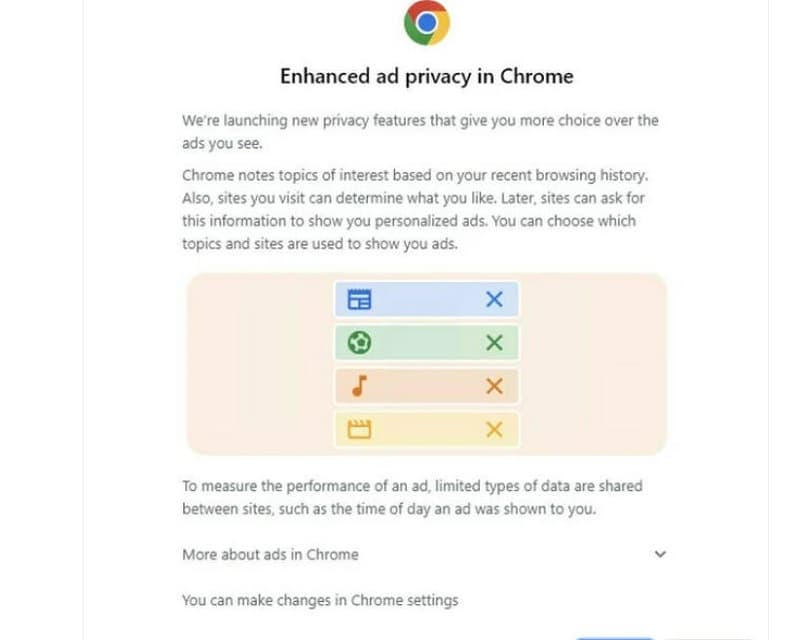Google is opening up the Privacy Sandbox in Chrome to developers. It is an alternative to third-party cookies and is used by advertisers to show personalized advertising. What will change from the cookie principle we know?
Privacy Sandbox has been made generally available by Google. Unlike the tech giant describes the feature as “an important step toward a more privacy-friendly Internet,” users do not share that opinion. What is the Privacy Sandbox anyway?
Topics API, FloC or the Privacy Sandbox
Google first gave shape to the idea of an alternative to third-party cookies in 2019. This first design received the name FloC and failed massively. The idea of grouping users with similar internet behaviour to create different groups on which advertisers could filter for targeted advertising wasn’t welcomed nicely by WordPress, GitHub, Amazon and all major browsers. Most organizations refused to implement the technology, and FloC was radically taken off the table.
A year later, Google thought it had sufficiently polished the idea and launched Google Topics API. The Topics API analyzes browser history from the past three weeks to determine a browser user’s areas of interest. When the user lands on a site with the Topics API, the API shares three random areas of interest with the site. This allows the site to offer personalized content, including ads. Google promises that users can view and change their areas of interest. That idea became a part of the Privacy Sandbox.
The entire Privacy Sandbox is more comprehensive, however. In all, there are six sections that website developers can write code for to take advantage of the API. Protected Audience allows departing visitors from your website to see your products on other websites they visit afterwards. Shared Storage allows websites to store unpartitioned cross-site data and read it in a secure environment to prevent leaks. Private Aggregation combines the two previous APIs to create data reports. Attribution Reporting also provides data collection and allows you to measure interactions with your ad. Finally, there is Fenced Frames. This API ensures content is loaded into a website in a secure way and prohibits the content from sharing data with another website.
Did anyone ask for less free choice?
In the whole idea of the Privacy Sandbox, the Topics API provokes a lot of criticism. The idea behind FloC and later the Topics API was and is better user privacy. Google only fails at that repeatedly, and any alternative to the third-party cookies is always received negatively because the privacy story from the search giant is just not sufficient compared to the attitude of other web browsers.
The search giant continues to believe that personalized ads are an indispensable part of the internet. Quarterly figures from Google’s parent Alphabet show that ad revenue is a fundamental part of the revenue generated. Moreover, ad revenue continues to grow annually, and the ad business rose another 4.7 percent in the latest report published in June 2023. That will undoubtedly affect Google’s attitude toward personalized ads.
The vision of rival web browser Safari, part of Apple, takes another route. Safari continues to restrict data collection methods, such as third-party cookies, to ensure the privacy of its browser users. Since May 2020, third-party cookies have been blocked by default. A stance that the web browser Mozilla also adopted six months earlier.
When introducing the Topics API, the browser provider assured that the FloC alternative would be adapted based on feedback from partners and internet users. But about no one shows excitement for the alternative, so it’s guessing exactly which users the tech giant was listening to.
Furthermore, the move to the Topics API means a limitation of choice or advertisers. The ecosystem Google now devised to measure ad reach and share ads will become the new standard. Technologies from other providers are no longer welcome in this regard and will soon be completely unusable within Chrome.
Google leverages its power
The Privacy Sandbox will become the alternative to third-party cookies. Websites will have to install the new initiative because, on Jan. 1, 2024, Google will begin filtering out third-party cookies from the web browser at a leisurely pace. The goal is to bring the curtain down on third-party cookies by mid-2024.
Google itself is convinced it has come up with a wonderful solution to respect users’ privacy and come into compliance with the GDPR. Internet users already disagree, but competing browsers from Apple and Mozilla have also criticized the new Topics API. Consequently, they will not support the alternative.
For Chrome users, the alternative is currently fully rolled out. In doing so, users were shown a pop-up with information about the initiative. Those who do not want to use the alternative can easily ignore it as a resident of the EU. Applicable laws within the EU force Google to offer the Topics API on an opt-in basis.

An example of the pop-up announcing the Privacy Sandbox.
